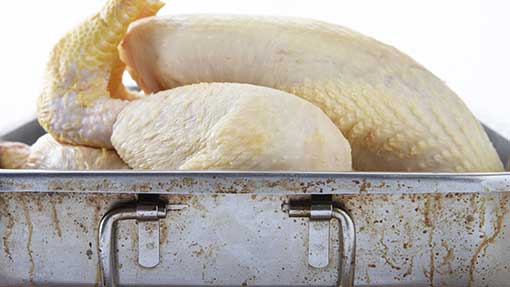Video: Consumers urged not to wash raw poultry

“Don’t wash raw chicken” is the central theme of this year’s Food Safety Week, launched today (Monday 16 June) by the Food Standards Agency (FSA).
The call has been made to help raise awareness of the dangers of contracting campylobacter, the most common form of food poisoning in the UK, affecting an estimated 280,000 people a year.
About four in five of these cases come from contaminated poultry, says the FSA, and the resulting illness can cause abdominal pain, severe diarrhoea and vomiting. In certain cases, it can lead to irritable bowel syndrome, reactive arthritis and even death.
See more: Poultry sector commits to fight campylobacter
A new survey has revealed that 44% of people in the UK always wash their chicken before cooking it, even though this can spread the bacteria through the splashing of water droplets on to work surfaces, kitchen utensils and other foodstuffs. In Scotland and Wales the figure is even higher, at 48%.
The most cited reasons people gave for washing chicken were the removal of dirt (36%), getting rid of germs (36%) and that they had always done it (33%).
The survey also found levels of awareness of campylobacter are well below that of other forms of food poisoning. More than 90% of the public have heard of salmonella and E coli, whereas only 28% know about campylobacter. Furthermore, of those who have heard of campylobacter, only 31% know that poultry is the main source of the bacteria.
FSA chief executive, Catherine Brown, said: “Although people tend to follow recommended practice when handling poultry, such as washing hands after touching raw chicken and making sure it is thoroughly cooked, our research has found washing raw chicken is also common practice.
“That’s why we’re calling on people to stop washing raw chicken and raising awareness of the risks of contracting campylobacter as a result of cross-contamination.
“Campylobacter is a serious issue. Not only can it cause severe illness and death, but it costs the economy hundreds of millions of pounds a year as a result of sickness absence and the burden on the NHS.”
As part of the campaign, the FSA, together with all the major food retailers, has also written to TV production companies asking them to help spread the message on any cookery and food programmes they might be running.
During Food Safety Week, all the major supermarkets will also be running features on food safety in their customer and staff magazines, on their social media channel and websites, in stores, and in their in-house cookery schools, reminding people not to wash raw chicken.
For more information on the FSA’s campylobacter campaign, and for guidance on the safest way to handle chicken, visit food.gov.uk/chicken
